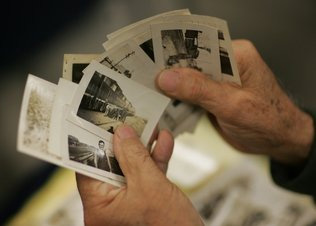
|  |  |  Americas & Beyond | January 2009 Americas & Beyond | January 2009  
Deadline Monday to Claim Reimbursement for Former Braceros
 Susan Ferriss - Sacramento Bee Susan Ferriss - Sacramento Bee
go to original


| | Crescencio Acevedo, 86, looks at pictures of his days as a bracero. One-time wage reimbursements for former braceros are the result of campaigns and the settlement of a lawsuit. (Bryan Patrick/Bee) |  |
As the Monday deadline approaches, attorneys for former Mexican braceros say they are getting hundreds of phone calls on a hotline set up to explain how to file for a wage reimbursement at Mexican consulates.

The obstacles to filing a claim have disappointed many former guest workers and survivors, who, if they live in the United States, are concentrated in California, Texas and the Chicago area. Few Mexican Americans in California have no tie to a bracero.

Since the reimbursement program began in late October, several hundred claims have been filed at the Mexican Consulate in Sacramento. The Sacramento consulate will be open today to help applicants fill out forms, said Consul Alejandra Bologna.

Unofficially, bracero attorneys say, about 5,000 claims have been filed in the United States and 45,000 in Mexico.

The one-time payments of $3,500, which will come from a Mexican government fund, are the result of campaigns in Mexico and the settlement of a U.S. lawsuit concerning an estimated $32 million deducted from braceros' checks during World War II and deposited in savings accounts in Mexico as an incentive for the workers to return to their home country.

That money was never returned to workers.

Because of stiff documentation requirements, many bracero families in the United States and Mexico have been rejected or have decided not to pursue claims. They have been unable to find ID cards and original paperwork needed to prove work history as a bracero between 1942 and 1964.

"All we have left is a picture of my father, who was a big, tall guy, standing there in front of the Union Pacific, right here in Sacramento," said Victoria Enriquez of Lincoln.

She said her late father, Raymond, was recruited to work as a bracero on trains and military vehicles during World War II, when the United States turned to Mexico to ease labor shortages.

Enriquez said her father married her mother, a woman he met in Sacramento who had come west from Missouri in "a 'Grapes of Wrath' type of thing."

Enriquez concluded she couldn't document her father's history.

Natalie Sanchez's father, Jose Cruz Maldonado, 80, of Turlock, was luckier when they went to the Mexican Consulate in Sacramento.

"My father was very prepared. He had documents," Sanchez said. She said she was expecting the process to be a disaster, but a consular employee was "very helpful, very patient."

"Unfortunately," she added, "we saw a lot of other people who didn't have the documents and were turned away."

Stockton immigrant labor activist Luis Magana, son of a bracero, said he hopes the Monday deadline for people to file in the United States will be extended. For braceros who live in Mexico, the deadline for filing a claim is Jan. 28.

The bracero era was a significant chapter in the modern American West and parts of the Midwest.

A U.S.-Mexico agreement led to the wartime program, which was extended until it was shut down in 1964 because of complaints of abuse.

Matt Piers, a Chicago attorney, established an information hotline in October after he reached a settlement with Mexico allowing U.S-based braceros to apply for claims.

"The Monday after Thanksgiving we got 600 calls," Piers said.

Magana said for that many braceros and survivors, the claim money would be nice to get. But just as important, he said, is "the sense that they want to correct an injustice."

The Bee's Susan Ferriss, sferriss(at)sacbee.com |

 |
|  |



